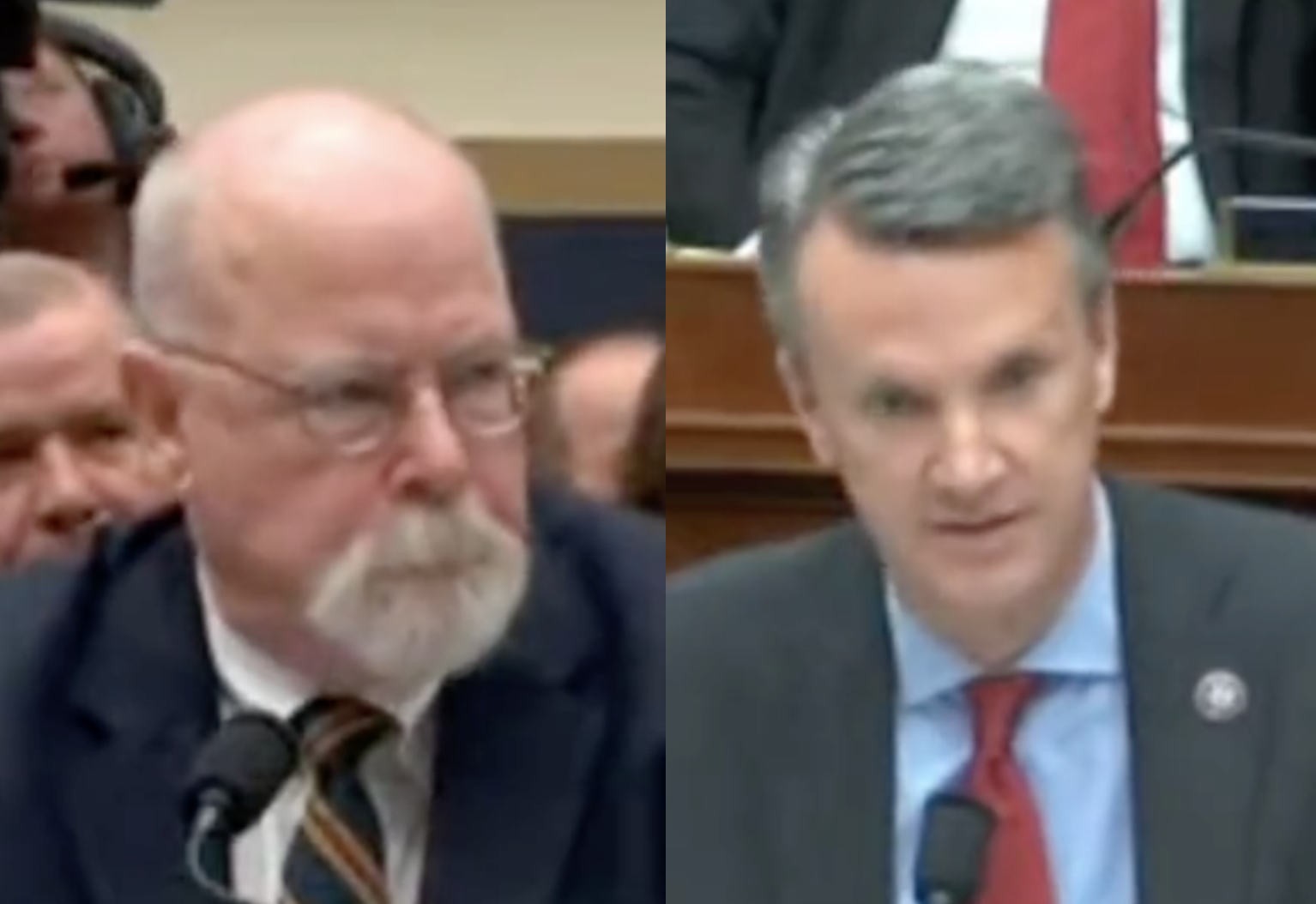Politics
BREAKING: John Durham Reveals How FBI Fabricated Evidence To Obtain FISA Warrants

During his testimony before the House Judiciary committee on Wednesday, Special Counsel confirmed under oath that not only was there no adequate basis to launch the Crossfire Hurricane investigation, but that the the FBI failed to examine all of the exculpatory evidence to their disposal.
This fascinating line of questioning from Rep Cline confirms all of the shocking details from Durham’s troubling report. At one point in the testimony, Cline asks Durham to expand on how FBI agents fabricated evidence when submitting the FISA report. Read the exchange below:
CLINE: “Mr. Durham, your report is not just sobering, as you stated, it’s outrageous and deeply troubling. Can you confirm these several main points that it found? The FBI did not have an adequate basis on which to launch Crossfire Hurricane, correct?”
DURHAM: “That’s correct.”
CLINE: “The FBI failed to examine all available exculpatory evidence, correct?”
DURHAM: “Correct.”
Watch the whole exchange here:
WATCH:
They continue:
CLINE: “FBI leadership continued the investigation even when case agents were unable to verify the evidence, correct?”
DURHAM: “That’s correct.”
CLINE: “The FBI did not interview key witnesses in Crossfire Hurricane, correct?”
DURHAM: “Correct.”
CLINE: “And individuals within the FBI abused their authority under the Foreign Intelligence Surveillance Act, correct?”
DURHAM: “Correct.”
CLINE: “The FBI immediately opened Crossfire Hurricane as a full counterintelligence investigation. What other options could the FBI have taken rather than immediately opening such an investigation?”
DURHAM: “Attorney General Edward Levy essentially created the guidelines in this area, these three divisions of assessments, preliminary and then full, although they were different names at the time. That has evolved over time and become more particular. In this instance, the information that they had received from Papadopoulos about a suggestion of a suggestion and not anything about emails, but just a suggestion of a suggestion, was sufficient and would have been, would have required the FBI to take a look at, well, what is this about? The opening is an assessment, and then you would analytically go try to collect intelligence that either supports or refutes or explains that information. That’s the whole purpose of it. You assess it, and if the evidence bears it out, you go to a full investigation where you have all the tools available, including the most intrusive physical surveillance and electronic surveillance of U.S. citizens. Here they just immediately want to open it as a full investigation without ever having talked to the Australians or gathered other evidence.”
CLINE: “Right. So investigators relied on misstatements by the confidential human source ignored exculpatory statements made by Papadopoulos in submitting the FISA application to surveil Carter Page, correct?”
DURHAM: “That’s correct.”
CLINE: “Is it true that an FBI employee fabricated this evidence? Can you expand on that fabrication and the reliance to support that FISA application?”
DURHAM: “In connection with one of the agents who had come on board wanted to be certain that there was information that, was there information as to whether or not Carter Page had been a source of information to the CIA, and pressed Kevin Clinesmith, in the General Counsel’s Office of the FBI, on that point. Clinesmith got a hold of people at another government agency, intelligence agency on the issue, and that person indicated, not indicated, said that yes, in the FBI parlance, Carter Page was the source, and put that in writing. When Clinesmith talked to the agent who was saying, we want to be sure on this, was he or was he not a source, Clinesmith said, no, he said he’s not. He said, did we get that in writing? Clinesmith said yes, and they said, well, I want to see it. And then Clinesmith altered the other government agency document to reflect this, to say that Page was not a source, when he in fact was a source. That’s the gist of it.”
CLINE: “What did the investigators mean when they said they hoped the returns on the Carter Page vice application would, quote, self-corroborate? That is another troublesome thing.”
DURHAM: “Maybe Agent was, they’re saying, well, if we can get on surveillance, electronic surveillance of Page, then we’ll find out, essentially, whether we really do have probable cause or not. He would self-corroborate in that sense.”
CLINE: “Are investigators supposed to corroborate information before or after it’s included in a FISA application?”
DURHAM: “Yeah. You have to have that before you intrude in the liberties of American citizens.”
CLINE: In fact, the FBI is required to follow its Woods procedures, which the FBI adopted to ensure the accuracy of the information contained in FISA applications, correct?
DURHAM: “That’s correct.”
CLINE: “And did FISC, did the FISC ever criticize the FBI’s handling of the Page FISA application?”
DURHAM: “Yes.”
CLINE: “And what were some of those concerns that they raised?”
DURHAM: “Ultimately, the FISC issued an order, a memorandum, indicating that had the information that was disclosed in the investigation done by Inspector General Horowitz in a very thorough job and a good job in a well-written report, had they known that, at least the second and third renewal applications would not have established probable cause. And I think is included in this report, I think it’s highly doubtful that there would have ever been an application submitted, and if it was submitted, that the FISC would have ever application submitted, and if it was submitted, that the FISC would have ever granted that order. Thank you, I yield back.”
Stay tuned for more developments from this shocking hearing….

